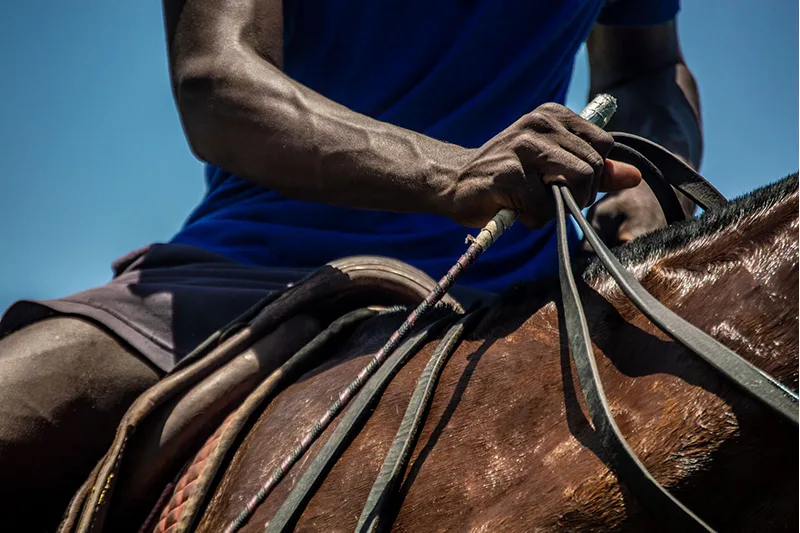I considered using this column to address the lack of minority representation in equestrian sport, our industry with a demographic that doesn’t mirror global diversity. I weighed dissecting the legitimacy of privilege and the role it plays in keeping horses out of reach from the average human being.
There may be no better time than now to share my perspective on these subjects, but as a black woman exhausted by the fumes of atrocity, I can’t write around the pigmented elephant in the room.

Whether I was volunteering with horses or caring for them at a full-time job, I always loved pulling my phone out to photograph them. I will never regret the day I took a leap of faith and purchased my first professional camera. Tori Repole Photo
I was 17 years old when neighborhood watchman George Zimmerman murdered Trayvon Martin. I had always known of the price tag pinned to black skin, from the microaggressions of, “She’s pretty for a black girl” to the textbook soundbites that limit black history to slavery and oppression. When Martin, 17, was blamed for his own death on social media and taunted by Zimmerman with the sale of the murder weapon touted as “an American firearm icon,” I saw a world apathetic to the black community.
Eight years have passed, yet the hashtags continue to rise as street signs at the crossroad where racial profiling meets brutality. During the thick of the coronavirus pandemic, George Floyd became the latest victim to a system of policing rooted in black oppression. The 46-year-old’s cry for his deceased mother couldn’t save him, a contrast to the hands-off approach reserved for the white men and women who protested stay-at-home orders while armed and belligerent.
Some members of the COTH community responded with anger when Sophie Gochman, 17, spoke publicly on Floyd’s passing and addressed white privilege and our sport’s lack of inclusivity.
Some raised concern over the left-field discussion that had descended upon our insular niche. Others worked to discredit Gochman’s perspective and questioned why the messenger was an underage white girl with billionaire lineage, an epitome of privilege. A few even went to the extent of criticizing the clothes Gochman wears and the posts she shares on social media, a scarlet letter approach to silencing women who go against the status quo.
I reached out to Gochman after her article went up online and extended my gratitude for her bravery, as I know the penalties for backing the minority.
When I worked at Planet Fitness a year before finding a home in equestrian journalism, I regrettably engaged with a white member on racism and police brutality. As our conversation progressed, and others chimed in to reason against his passioned indifference, his temper quickly escalated. It wasn’t the expletives he used to degrade me or his threat to have me killed that saw him banned from the facility, but the front door he slammed off its hinges.
ADVERTISEMENT
As equestrian media navigates the entwinement of horses and real-world complexities, there will be those like Sir Roid Rage, who rear at the opportunity for discussion. It’s easier for them to walk in comfort’s complacency than to acknowledge their role in the system built solely for white longevity. It’s easier for them to deflect than to recognize the plight of those living and dying on the frontlines of white discomfort.
Unlike the average equestrian, I didn’t grow up around horses. I found a love for them in high school through Kiwanis Horses & Handicapped, where I volunteered for five years in Davie, Florida. In 2013, the gift of a riding lesson brought me to a dressage barn where I’d progress from working student to barn manager throughout those 2 ½ years.
I remember the day a black couple came to inquire about lessons, and I’ll never forget how surprised my boss and a boarder were by their kind and respectful demeanor. I was saddened, but not shocked to overhear their conversation, as they agreed, “They’re just like Tori.”
In predominantly white spaces like equestrian sport and beyond, I carry the weight of representing my black community with every outfit, utterance and gesture. I know the stares of fearful uncertainty, which I disarm with an I’m-not-going-to-hurt-you smile for those who only know of black people through what they read or see on television.
There is no need to extend sympathies or the “not all” rhetoric. Digest this reality and continue the conversation in solidarity with those of us taught from childhood how to navigate life while black.
If you want to want to add to the conversation, please get in touch. My email address is trepole@coth.com.
Tori Repole was born in Kingston, Jamaica, and immigrated to Florida at age 7. She developed a passion for journalism through writing and photographing horses, and broke into equestrian media with her first published piece in 2017. While Repole, 25, did not attend college, she strengthened her experience and contacts before landing a full-time position with The Chronicle of the Horse in 2018. A formerly undocumented immigrant, Repole is now a nationally published writer and dedicates her free time to extracurricular projects, including photographing several assignments for the United Nations Development Program in 2019.














